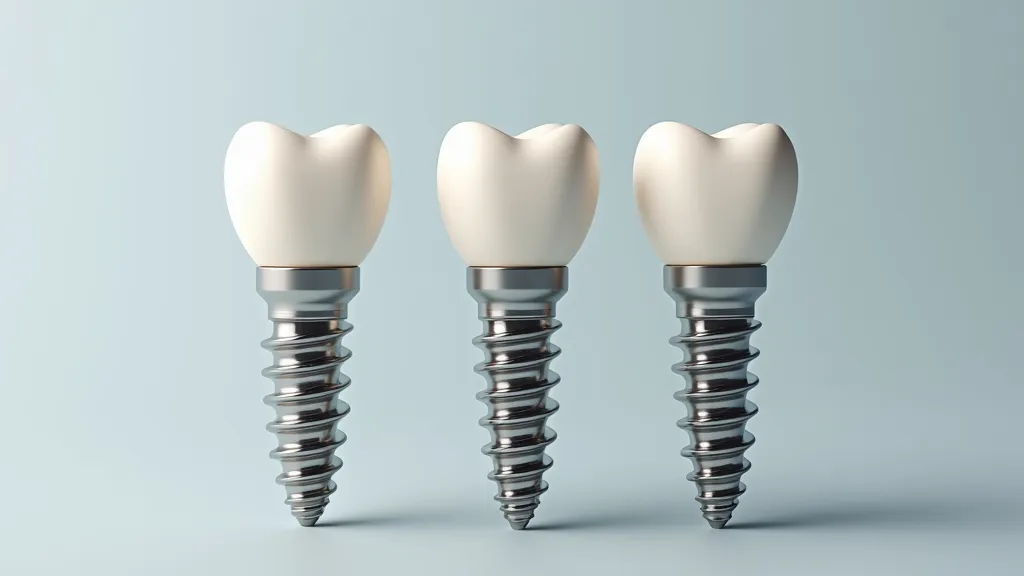Good Dental Implants for Seniors
This guide explores good dental implants for seniors, focusing on their benefits and cost-effectiveness. Dental implants serve as a revolutionary restoration option, offering durability and a natural appearance. Our in-depth analysis highlights the cost variations across different regions, low-cost options for English-speaking countries, and practical advice on how seniors can access these vital procedures affordably.

Understanding Good Dental Implants for Seniors
For seniors seeking a durable and aesthetically pleasing solution to missing teeth, good dental implants represent a cutting-edge advancement in dental care. Unlike traditional dentures, these implants can provide unparalleled stability and a natural look, contributing significantly to the wearer’s oral health and quality of life. The emergence of dental implants has been hailed by dental professionals as one of the most significant innovations in restorative dentistry, particularly advantageous for aging populations facing various dental issues.
The Anatomy of Dental Implants
To fully understand how dental implants work, it’s essential to explore their anatomy. A dental implant typically consists of three major components: the titanium post, the abutment, and the crown. The titanium post serves as the root of the new tooth, which is surgically inserted into the jawbone. Being biocompatible, titanium integrates with the bone – a process known as osseointegration – ensuring stability and strength.
The abutment is a connector that sits on top of the implant post and supports the crown. This crown is custom-made to match the color, shape, and size of the surrounding teeth, providing a seamless appearance for the patient. Together, these components work harmoniously to restore both function and aesthetics, granting seniors the confidence to eat, smile, and speak without concern.
Benefits of Dental Implants for Seniors
The advantages of good dental implants are particularly significant for seniors. They offer improved chewing ability, helping to maintain a nutritious diet, and contribute to the preservation of facial structure by preventing bone loss. Moreover, dental implants reduce the need for further dental procedures thanks to their longevity. Studies have shown that seniors with implants experience fewer oral health issues compared to those who rely on traditional dentures.
Moreover, dental implants can greatly enhance psychological wellbeing. Many individuals experience self-esteem issues due to missing teeth, leading to withdrawal from social activities. Having implants restores these individuals' confidence, allowing them to reintegrate into social settings without the fear of judgment. The positive impacts extend beyond the physical, affecting emotional health and lifestyle choices.
Additionally, dental implants don't rely on surrounding teeth for support, eliminating the need to alter healthy teeth for bridgework. This way, seniors can preserve the integrity of their natural teeth while also enjoying the benefits of a complete smile. Furthermore, with advancements in technology, the implant process has become more efficient and less invasive, often resulting in shorter recovery times for patients.
Cost of Dental Implants in English-speaking Countries
Pricing for dental implants varies widely across English-speaking countries, reflecting differences in healthcare systems and market dynamics. Understanding these price variations can empower seniors to make informed decisions regarding their dental care:
- United States (US): The cost typically ranges from $3,000 to $6,000 USD per implant, which may not include additional procedures such as bone grafting, sinus lifts, or temporary crowns.
- United Kingdom (UK): In the UK, patients can expect to pay around £2,000 to £2,500 GBP per implant, often including consultations and follow-up appointments.
- Australia (AU): Australians may find dental implant costs between AU$3,500 to AU$6,500 AUD, with various dental practices offering financing plans to ease payment.
- Canada (CA): In Canada, the costs are comparable, typically ranging from CA$3,000 to CA$5,500 CAD, influenced by location and the complexity of the case.
Factors Influencing the Cost of Dental Implants
The cost of dental implants can be influenced by several factors, each relevant especially to seniors considering the investment:
- Location of the Dental Practice: Urban areas often have higher costs due to overheads, whereas more rural practices might offer more competitive pricing.
- Experience of the Dentist: Well-established dentists with advanced training and credentials may charge more due to their expertise.
- Additional Procedures: If a patient requires bone grafting, sinus lifts, or other preparatory services before placing the implants, these can add substantially to the overall cost.
- Materials Used: The type of implant materials chosen (e.g., titanium vs. zirconia) can affect the overall price.
Accessing Low-cost Dental Implants
For seniors on a fixed income, obtaining dental implants at a lower cost is essential. Here's how they can navigate the options:
- Research Affordable Clinics: Websites like Dental Views and Atlantic Dental Group specialize in affordable dental implant solutions, featuring clinics that offer discounts or sliding-scale fees.
- Consider Dental Tourism: Platforms like DentaVacation help patients save significantly by seeking treatment in countries with lower costs, while still maintaining high standards of care.
- Look Into Insurance Options: Reviewing available plans on sites such as ADHP can provide pathways to reduce expenses. Many insurance plans are beginning to cover part of the expenses for implants as they recognize the long-term benefits of maintaining oral health.
Material Choices for Implants
Another important factor to consider is the material used in dental implants. The two most common materials are titanium and zirconia. Titanium is widely used due to its strength and biocompatibility, meaning it can integrate well with the body and withstand chewing forces effectively. On the other hand, zirconia is a newer option that is gaining popularity due to its aesthetic appeal as it can be more tooth-like in color, making it ideal for visible areas. However, it is less studied in terms of long-term success rates compared to titanium.
The choice of implant material can also influence the cost, with titanium often being more affordable. Discussing the benefits and drawbacks of each option with a dental professional can help seniors make an informed choice based on their specific needs, preferences, and budget.
Comparison of Dental Implant Providers
| Provider | Feature Highlight |
|---|---|
| Dental Views | Focuses on low-cost dental implant solutions, offering a network of affordable providers. |
| Atlantic Dental Group | Wide range of dental services including implants, emphasizing quality care at reasonable prices. |
| DentaVacation | Specializes in dental tourism for cost savings, providing options for international care. |
source: Dental Views, Atlantic Dental Group, DentaVacation
Cost-effective Strategies for Seniors
Seniors can take several approaches to manage their dental implant expenses effectively:
- Utilize Dental Insurance: Comprehensive plans can cushion the financial impact of dental treatments, especially those that cover periodontics and prosthodontics.
- Explore Payment Plans: Many clinics offer financing options to distribute the cost over time, making it easier for seniors to budget without experiencing financial strain.
- Seek Community Clinics: Some local and community health clinics offer dental services at reduced rates for seniors, especially services that cater to low-income patients or those without insurance.
- Participate in Dental Savings Plans: Consider joining a dental savings plan, which often provides significant discounts on various dental procedures when members pay a yearly fee.
Long-term Care for Dental Implants
Once dental implants are placed, the focus shifts to maintaining them for optimal long-term success. Good oral hygiene is fundamental; seniors should adhere to a diligent oral care routine that includes brushing twice a day, flossing daily, and regularly visiting a dentist for check-ups and cleanings.
It’s also crucial to monitor any underlying health conditions, such as diabetes or osteoporosis, which can affect bone healing and implant stability. Seniors should communicate openly with their dental care providers about any changes to their health status that could impact their dental care.
Importance of Regular Dental Visits
Even after receiving dental implants, regular dental check-ups are crucial. Dentists can evaluate the health of the gums, check for signs of infection and ensure the implants are well integrated and functioning properly. In addition, these visits provide an opportunity for professional cleanings, which help to maintain gum health and detect potential issues early.
FAQs
- Are dental implants suitable for all seniors?
- Yes, provided they have a healthy jawbone and no contraindicating medical conditions. Factors such as bone density and periodontal health are crucial to successful implantation. A thorough dental examination is essential for determining suitability.
- How long do dental implants last?
- With proper care, dental implants can last a lifetime, with studies indicating a success rate of over 95% in healthy individuals. However, the crown may need periodic replacement after about 10 to 15 years depending on wear and tear.
- Is the procedure painful?
- The implant procedure involves minimal discomfort, usually managed with local anesthesia and analgesics. Many patients report that the pain post-surgery is much less intense compared to tooth extraction experiences.
- What factors affect the cost of dental implants?
- Factors include the type of implant, the dentist's expertise, the clinic’s location, and additional procedures like bone grafting. Geographic factors can also complicate costs, with densely populated urban areas often being pricier.
Conclusion
Good dental implants offer a valuable solution for seniors seeking to enhance their oral functionality and aesthetics. While costs can be substantial, exploring low-cost providers and leveraging insurance options can make them more accessible. The long-term benefits of dental implants, such as improved quality of life and enhanced self-confidence, far outweigh the initial expenses involved. As with any significant medical decision, consulting with a professional for personalized advice is crucial. It's imperative to weigh the pros and cons and explore all financial avenues to ensure that dental health remains a priority in the golden years.
Disclaimer: The above information comes from online resources, and the data is as of October 2023. Dental implant prices are for reference only and may vary by region, clinic, and doctor.
Reference links:










